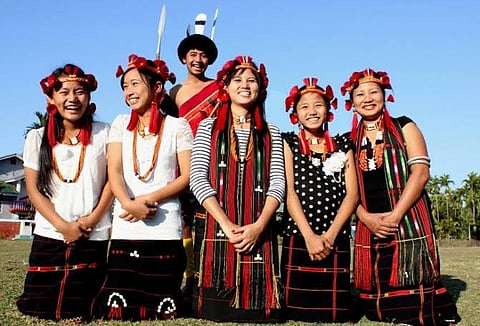
- LIFESTYLE
- FASHION
- FOOD
- ENTERTAINMENT
- EVENTS
- CULTURE
- VIDEOS
- WEB STORIES
- GALLERIES
- GADGETS
- CAR & BIKE
- SOCIETY
- TRAVEL
- NORTH EAST
- INDULGE CONNECT

Nestled between the lush greenery of Nagaland hills comes the soundcape of laughter, celebrations, folk music and the aroma of delicious food, every year as the time nears for the Tuluni Festival. This vibrant Festival is celebrated annually by the Sumi Naga tribe of this State, and this year the celebrations are scheduled for July 8. Tuluni Festival is a symbol of celebrating the plenty, thanking for the harvest and bonding as a community.
For the agrarian community of the Sumi Naga tribes from Nagaland, the Tuluni Festival observing the monsoon and the critical role the rains play in farming, is an important mark of respect towards Nature and its bounty. In fact, tuluni, itself is a Sumi word which denotes ‘season of plenty’. The Festival originates from the pre-Christian animist traditions where nature and its bounties like rain and earth are worshipped as spiritual deities. However, today while the basis has gone deeper into Sumi Animist philosophies, the Festival with all its grandeur is kept alive as a mark of cultural celebration in Naga heritage.
The Festival is also considered very auspicious for marriages and settling disputes between families. In fact, many marriages or formal announcement of marriages and bride-price negotiations take place during the Tuluni Festival. It is believed that the spiritual deities also worship the start of any new relationship, just like through their blessings earthy fertility and crops grow in abundance. Moreover, it is also the time to reiterate the unity within the Sumi clan and thus all disputes are urged to be settled around the Festival.
No celebration is complete without the traditional feast and local cuisine. For the Tuluni Festival, one of the major attractions is the consumption of locally brewed rice beer. This is called Tuluni which matches with the Festival name as well. Using the very popular north-eastern technique of fermentation, the Tuluni rice beers are made out of fermented sticky rice. Keeping up with traditions they are also consumed in bamboo mugs or horns, both of which are significant markers of Sumi heritage. Culinary feasts also include large varieties of meat which are cooked by and for the whole village.
Anyone visiting the Sumi populated villages of Nagaland like the Zunheboto district during the Tuluni Festival would find villagers dressed in traditional attires singing and dancing to folk songs using indigenous musical instruments. These attires are elaborate and intricate with beadworks, warrior motifs, expansive headgears, beaded jewellery and spears or other weapons. In fact, white, black and maroon colours take centre stage in the folk attires.
If you are in Nagaland on July 8, then do keep a day off for visiting this vibrant festival steeped in history, culture and tradition. The ever-smiling faces and the hospitality that guests receive make them want to return every year for a glimpse of the homeliness.
For more updates, join/follow our WhatsApp, Telegram and YouTube channels.